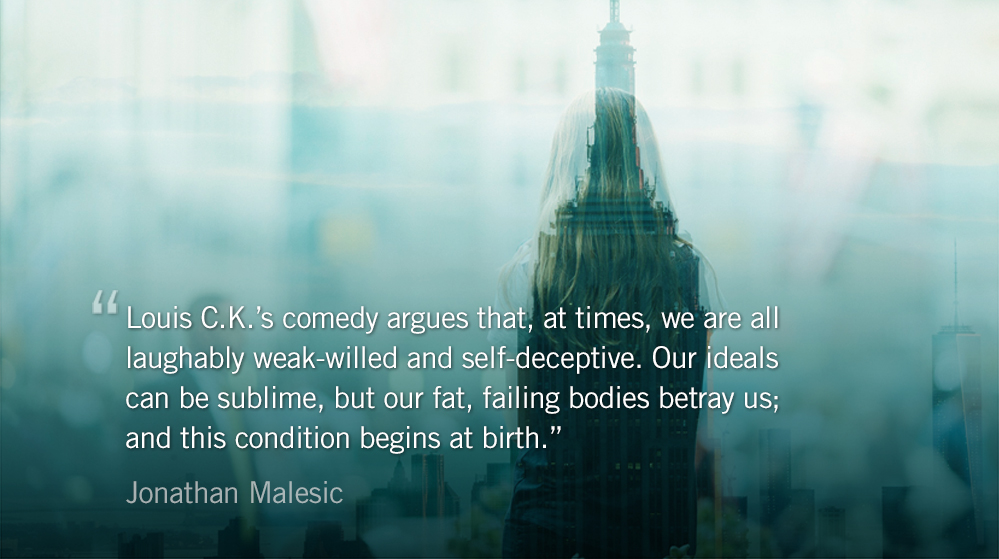“Louis C.K.’s comedy argues that, at times, we are all laughably weak-willed and self-deceptive. Our ideals can be sublime, but our fat, failing bodies betray us; and this condition begins at birth,” writes Jonathan Malesic in a wonderful piece on Augustine and the “theology of Louis C.K.”
The comedian is known equally for his vulgarity and brute honesty of the human condition. Malesic explores how the two work together to paint a picture of sin in the modern secular world:
The comedy of Louis C.K. plunges into moral depravity in order to discover its illogic. By contrast, George Carlin’s comedy understood sin only on a third-grade level, as an action that breaks the (to him, absurd) rules. In Louis C.K.’s comedy, sin is perverse desire. It is a profound Augustinian thread. Following it leads to some of Louis C.K.’s best insights but also to his darkest and most questionable material.
Yet an understanding of sin without an acceptance of the gospel leads to despair and futility. “Louis C.K.’s comedic universe does not include supernatural grace or a city of God,” Malesic concludes. In an interview on NPR’s Fresh Air C.K. summarizes his understanding of religion through the words he remembers his priest telling him during confession, “Try — try harder.”
Augustine, in his work City of God condemned this way of thinking as a “marvelous shallowness.” It is another way, the theologian said, in which humans try to find their chief blessedness “in this life and in themselves.”
Augustine saw a way out of sin, of course. His rigorous examination of conscience leads to his awareness of a need for God’s grace. And knowing that God has already bestowed that grace is a cause for joy.
The theologian leads us to Christ, the comedian causes us to ask how we interact with the modern world on a daily basis. Can we enjoy the things of the world while relentlessly pursuing Christ?
In his book Becoming Worldly Saints Michael Wittmer explores “God’s enthusiastic embrace of the material world.” Wittmer acknowledges the ongoing tension of loving God with all our heart, soul, and mind and enjoying the world God created. “If we ever stop feeling the pull between creation and redemption, that can only mean we’ve fallen off one side or the other.” Christianity Today summarizes:
While Wittmer affirms a worldly faith that embraces earth, he is also careful to emphasize the priority of heaven—and the purposes of redemption. He warns against finding ultimate satisfaction and meaning in the things of this world. “The pleasures of creation must not lull us to sleep. We are at war, and we must never forget our heavenly calling.” To love the temporal world is good; to love eternity is best.
Left to ourselves this tension leads us in a circle. It is only when we pursue the transcendent truth and goodness of God as our chief end that we find both hope in this broken world and grace for our own sin. Or, as Augustine says,
“The just lives by faith,” for we do not as yet see our good, and must therefore live by faith; neither have we in ourselves power to live rightly, but can do so only if He who has given us faith to believe in His help do help us when we believe and pray.
Today’s Reading
1 Samuel 4 (Listen – 3:56)
Romans 4 (Listen – 4:08)
This Weekend’s Readings
Saturday: 1 Samuel 5-6 (Listen – 6:03); Romans 5 (Listen – 3:53)
Sunday: 1 Samuel 7-8 (Listen – 5:34); Romans 6 (Listen – 3:28)
Weekend Reading List
- Taking Sin Seriously in American, The National Catholic Review by Jonathan Malesic.
- Excerpts from Augustine’s City of God by Geralds Schlabach.
- Becoming Worldly Saints (review) on Christianity today by Jen Pollock Michel.
- Becoming Worldly Saints by Michael Wittmer. Zondervan, 2015.






